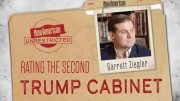
Republican Minority Leader Senator Mitch McConnell (R-Ky.) had a strategy even before President Obama was inaugurated, according to the New York Times. Recognizing that Republicans had lost control of the Senate as well as the presidency, that strategy was to use his 30-plus years of political wheeling and dealing to slow down the Democrat juggernaut, and wait for reinforcements.
During the current healthcare debate, McConnell bet that by presenting a united, even if a minority, front against Obamacare, and putting in place delaying tactics, Republicans would force the Democrats to use “parliamentary back flips” to get the bill passed and onto the President’s desk. Such Democrat efforts as reconciliation, the Slaughter tactic, and the “deemer” strategy would so dismay the average American voter as to derail the juggernaut before it became law.
Although such tactics have made the voting public increasingly cynical about the entire legislative process (see Rasmussen Reports for daily updates here) “in the short run at least, his approach has worked,” according to the Times. McConnell kept reminding his 40-member minority to avoid “the lure of … short-term attention to be gained [by going along with the Democrats on healthcare], and linked Republican gains in November to showing voters they could hold the line against big government.”
The Democratic whip, Richard Durbin (D-Ill.), agrees: “Their goal is to slow down activity to stop legislation from passing in the belief that this will embolden conservatives in the next election.”
McConnell holds himself out as a centrist, not a conservative. Of the Democrats, McConnell said, “To the extent that they want to do things that we [Republicans] think are in the political center and would be helpful to the country, we’ll be helpful.” But his pragmatic opposition to the rush to totalitarianism by the Democrats has earned him such titles as “staunch conservative” and a politician of “principled beliefs.”
In fact, McConnell holds a Freedom Index rating of 85 out of 100, and has taken strong stands against damaging legislation such as McCain-Feingold in 1995, calling it “neither fair, nor balanced, nor constitutional.” In 2009 the Supreme Court agreed with the unconstitutional part, inciting great resentment in the liberal media who saw it as diminishing their role in providing their readers with “all the news that fits” because news media were among the few corporate entities exempted from McCain-Feingold free-speech restrictions.
On the other hand, McConnell introduced the Protect America Act of 2007, which passed Congress and allows the NSA (National Security Agency) to “monitor telephone and electronic communications of suspected terrorists inside and outside the United States without obtaining a warrant.”
McConnell also voted for the Supplemental Appropriations bill that contained additional spending for the undeclared war in Iraq, and the unconstitutional “Cash for Clunkers” program, as well as the Interior-Environment Appropriations bill, which also contained mostly unconstitutional spending. He voted for the Medicare Prescription Drug Act, which has put the entire Medicare program into significant financial jeopardy. And McConnell has no problem ladling earmarks from the public trough for his Kentucky constituents. As one of the five members of the Appropriations Committee, he has used his influence to obtain 38 earmarks worth more than $60 million so far in fiscal 2010.
McConnell’s opposition to Obamacare isn’t based on its unconstitutionality. In an interview with Greta Van Susteren of Fox News recently, he said, “We need to start over, as we’ve been advocating — my side has been advocating for some time, start over and go step-by-step to fix the problem.” He explained that on the Republican side of the aisle, “We have broad philosophical diversity, and the Northeast Republicans are not exactly like a Southeast or a Western Republican.” But since every one of them “thought that [Obamacare] was a bad deal for America,” they presented a united front of opposition to the Democrats.
And McConnell no doubt has been a team player himself. The biography of Senator McConnell at the New York Times makes this clear:
McConnell has done much to build up Kentucky’s long ailing Republican Party. In 1994, he helped Ed Whitfield pick up the 1st District House seat and helped Republican legislative candidates win in eastern Kentucky. He backed Anne Northup in her win in the Louisville-based 3rd District in 1996, and he helped rescue Sen. Jim Bunning’s re-election campaign in 2004. He helped to persuade two Democratic state senators to switch parties in July and August 1999, which gave Republicans a 20-18 margin in the state Senate, and he has helped them hold that majority ever since.
The original Times article stated that “the extent of Republican unity to date is attributable to … the rise of the Tea Party movement which has exerted tremendous pressure on Republicans not to do anything that might give comfort to the president and his party.” This pressure can now be measured statistically, with a generic poll by Rasmussen showing American voters favoring Republicans over Democrats in the fall elections by 10 percentage points, “Their biggest lead ever in nearly three years of weekly tracking.” And voter unhappiness with Congress has “reached the highest level ever recorded … with 71% now saying the national legislature is doing a poor job.”
McConnell is biding his time. “I think the reason my members are feeling really good,” he said, “is they believe the reward for playing team ball this year was the reversal of the political environment and the possibility that we will have a bigger team next year.”
Real change that American voters will see, however, won’t come just by having a “bigger team” of RINOs trying to keep the United States in the “center,” but a better team as well, made up of constitutionalists who understand the rules, the limitations, the deliberate restrictions on government, regardless of whether they are from the Northeast, the Southeast, or the West. A bigger team? Probably. A better team? Only if the Tea Partiers and other constitutionalists continue to make inroads into Republican territory. And only if being a “team player” means playing by those rules.



